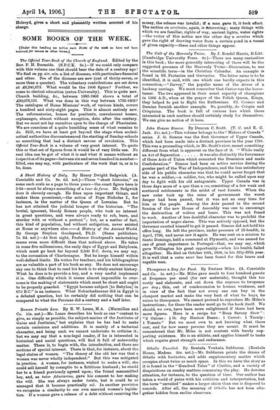A Short History of Italy. By Henry Dwight Sedgwick. (A.
Constable and Co. 8s. 6d. net.)—These "short histories," on some such scale as a page to three years—the exact figure here is 3.64—must be always something of a tour de force. Mr. Sedgwick does it cleverly enough. He fixes upon important things, and makes them prominent, —the action of Pope Nicholas I., for instance, in the matter of the Queen of Lorraine. But he has not attained the judicial temper of the historian. "The brutal, ignorant, bloody Roman people, who took no interest in great questions, and were always ready to rob, burn, and murder with or without a pretext"; but, as a matter of fact, this kind of population, bad without mitigation, never existed at Rome or anywhere else.—A History of the Ancient World. By George Stephen Goodspeed, Ph.D. (Same publishers. 78. 6d. net.)—At first sight, Professor Goodspeed's undertaking seems even more difficult than that noticed above. He takes in some five millenniums, the early days of Egypt and Babylonia, which must go back far beyond 2,500 B.C. down, we may say, to the coronation of Charlemagne. But he keeps himself within well-defined limits. He writes for teachers, and his bibliographies are as valuable a part of his book as any. He does not encourage ally one to think that to read his book is to study ancient history. What he does is to provide a key, and a very useful implement it is. One difficulty which it seems almost impossible to over- come is the making of statements which must be short and ought to be properly guarded. "Egypt became subject [to Babylon] in 670 B.C." is an instance. What Nebuchadnezzar did in Egypt is a debated question, but he certainly did nothing that can be compared to what the Persians did a century and a half later.






































 Previous page
Previous page